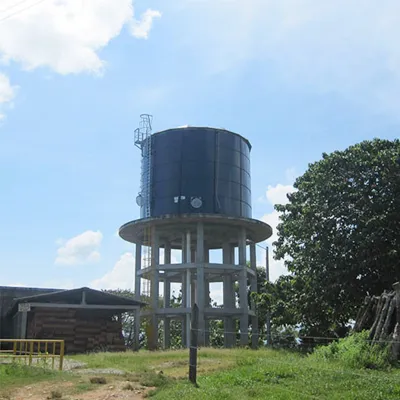The Advantages of GFS Tanks Used as Wastewater Tanks
In today’s advancing wastewater management industry, selecting the appropriate storage solution is essential for achieving both operational efficiency and long-term sustainability.
Why Are GFS Tanks Well-Suited for Wastewater Storage?
Glass-Fused-to-Steel (GFS) technology combines the structural strength of steel with the exceptional corrosion resistance of glass. This is achieved by fusing molten glass onto steel plates at high temperatures ranging from 820°C to 930°C. The resulting material is highly durable, robust, and resistant to corrosion, making GFS tanks an excellent choice for handling wastewater across diverse environmental conditions.
1. Exceptional Corrosion Resistance
Corrosion is a major challenge in wastewater storage, particularly when tanks are exposed to harsh substances such as industrial effluents, sewage, and chemicals. The glass-fusing process creates a smooth, non-porous surface that delivers outstanding corrosion resistance. This glass coating acts as a protective barrier, preventing the underlying steel from reacting with acidic, alkaline, and other corrosive agents commonly present in wastewater. As a result, GFS tanks offer a durable, long-term storage solution that preserves structural integrity and performance even under the most demanding conditions.
2. Outstanding Durability and Impact Resistance
Wastewater tanks frequently face considerable physical stresses, such as external impacts and intense operational pressures. GFS tanks are renowned for their excellent impact resistance and capacity to endure mechanical forces without losing structural strength or deforming. Whether under external shocks or internal volume fluctuations, these tanks consistently maintain their stability and reliable performance over extended periods.
3. Water and Leakage Resistance
Water impermeability is crucial in wastewater storage to prevent leaks and ensure secure containment. The glass lining of GFS tanks offers exceptional waterproofing, effectively preventing wastewater from escaping. Thanks to the seamless fusion between the glass coating and steel substrate, the tank walls are virtually impermeable to water and other liquids, making GFS tanks a dependable choice for even the most demanding wastewater storage applications.

4. Longevity and Low Maintenance
GFS tanks are engineered for durability, often providing a service life exceeding 30 years. Their superior corrosion resistance, impact strength, and impermeability contribute to a low-maintenance design that helps minimize long-term operational costs. With reduced wear and tear, these tanks demand fewer repairs or replacements than conventional storage solutions, making them a cost-effective and reliable investment for wastewater management over several decades.
5. Cost-Effectiveness
Glass Fused to Steel Tanks combine durability with cost-efficiency. Their modular bolted design enables quick and straightforward on-site assembly, which helps lower overall project expenses. This flexible modularity allows for customization to meet specific project requirements without costly alterations. Moreover, the tanks’ low maintenance needs and long service life contribute to significant reductions in operational costs over time, making GFS tanks an economical choice for both private and municipal wastewater applications.
6. Easy Installation and Flexibility
The modular bolted construction of GFS tanks allows for rapid on-site assembly, enabling efficient installation with minimal downtime. Their customizable design accommodates a wide range of capacities, ensuring wastewater storage requirements are met regardless of facility size or treatment volume. This flexibility makes GFS tanks suitable for diverse settings, from municipal sewage plants to industrial wastewater treatment facilities.
7. Sustainability and Environmental Benefits
With increasing emphasis on environmentally sustainable wastewater solutions, GFS tanks have become a preferred choice for eco-friendly projects. The glass coating process consumes less energy compared to alternative methods, and the tanks’ long service life reduces the need for frequent replacements, thereby minimizing waste and conserving resources over time. Additionally, GFS tanks’ capability to securely store various types of wastewater—including industrial effluents and sewage—supports environmental protection by ensuring safe containment and responsible treatment.
8. Wide Applications for Wastewater Treatment
GFS tanks are highly versatile and suitable for a variety of wastewater treatment applications, including:
Municipal Sewage Treatment: Providing a reliable and durable solution for storing and treating municipal sewage, addressing the unique challenges of urban wastewater management.
Industrial Wastewater Treatment: Ideal for industries handling chemicals, oils, and other contaminants, thanks to their exceptional corrosion resistance and durability for safe wastewater storage.
Landfill Leachate Storage: Offering an effective method to contain landfill leachate, preventing environmental contamination around landfill sites.
Bioenergy: Playing a vital role in storing biogas and organic waste products, supporting energy recovery processes within wastewater treatment facilities.
9. Compliance with International Standards
Our GFS tanks are manufactured in accordance with rigorous international standards, including AWWA D103-09, ISO 28765, NSF/ANSI 61, and NFPA. This ensures that our tanks consistently meet the highest quality, safety, and performance requirements. Trusted worldwide, Center Enamel’s tanks have been successfully deployed in wastewater treatment and sewage projects across more than 100 countries.
For more information or to request a quote for your wastewater treatment project, contact us today!
- 0


